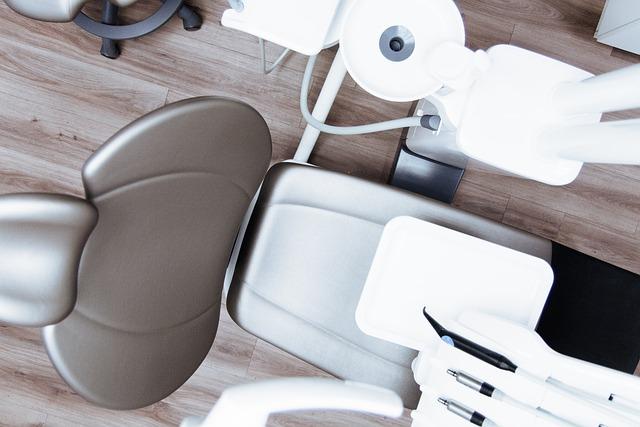Can You Brush Your Teeth with Salt: Exploring Options
Have you ever wondered if there’s an alternative to your regular toothpaste? Perhaps you’ve heard whispers of using salt as a tooth-cleansing agent, but you’re unsure if it’s a valid option. Well, wonder no more! In this article, we will dive into the intriguing world of brushing your teeth with salt and explore the possibilities it offers. As confident and knowledgeable guides, we will provide you with a neutral and clear understanding of this unconventional dental practice. So, sit back, relax, and let’s embark on this oral hygiene adventure together!
1. Understanding the Role of Salt in Dental Care: Exploring the Viability of Brushing Teeth with Salt
Salt has long been used as a natural remedy for oral hygiene, and its potential benefits in dental care are worth exploring. Brushing teeth with salt has gained popularity as an alternative to conventional toothpaste. Here are some key points to understand about the role of salt in dental care:
1. Antibacterial properties: Salt possesses natural antibacterial properties that can help fight against harmful bacteria in the mouth. It can inhibit the growth of bacteria and reduce the risk of oral infections, such as gum disease and tooth decay.
2. Gentle abrasive action: Salt can act as a mild abrasive when used in tooth brushing. It aids in removing plaque, stains, and food particles from the teeth, leaving them clean and polished. However, it is important to note that excessive scrubbing with salt may damage the tooth enamel, so gentle brushing is recommended.
3. Mineral-rich composition: Salt is rich in essential minerals like calcium, fluoride, magnesium, and potassium, which are beneficial for maintaining dental health. These minerals can help strengthen the teeth, promote remineralization, and reduce sensitivity.
While brushing teeth with salt can be a viable option for some, it is crucial to consult with a dentist before making any changes to your oral care routine. They can provide personalized advice based on your dental health needs. Remember, maintaining good oral hygiene practices, including regular brushing, flossing, and professional dental cleanings, is essential for overall dental health.
2. Debunking Myths: Is Brushing Your Teeth with Salt an Effective Dental Hygiene Option?
There is a popular belief that brushing your teeth with salt can be an effective dental hygiene option. However, it is important to debunk this myth and shed light on the actual impact of salt on oral health.
1. Abrasive nature: One of the reasons salt is believed to be beneficial for oral hygiene is its abrasive nature. While it is true that salt can help scrub away some plaque and stains, it can also damage the tooth enamel if used too aggressively or too frequently. It is essential to strike a balance and avoid excessive scrubbing.
2. Lack of fluoride: Salt does not contain fluoride, a mineral that is essential for strengthening tooth enamel and preventing tooth decay. Fluoride is a key ingredient in most toothpaste and mouthwash products recommended by dental professionals. Therefore, relying solely on salt for oral hygiene may leave your teeth vulnerable to decay and cavities.
3. Limited antibacterial properties: While salt does possess some antibacterial properties, they are relatively limited compared to other dental hygiene products. Saltwater rinses can provide temporary relief for minor oral irritations, but they are not a substitute for proper brushing, flossing, and using antimicrobial mouthwashes.
Overall, it is important to recognize that brushing your teeth with salt alone is not a comprehensive dental hygiene option. It may have some short-term benefits but should not replace regular brushing with fluoride toothpaste, flossing, and professional dental care. Consult with your dentist to develop a personalized oral hygiene routine that suits your specific needs.

3. The Science Behind Salt: Evaluating the Benefits and Drawbacks of Using Salt for Oral Health
When it comes to oral health, salt has been a topic of interest for its potential benefits and drawbacks. Let’s dive into the science behind using salt and evaluate its impact on maintaining a healthy mouth.
Benefits of Using Salt for Oral Health:
- Natural Antibacterial Properties: Salt has long been recognized for its antibacterial properties, which can help kill harmful bacteria in the mouth and reduce the risk of oral infections.
- Reduced Inflammation and Pain: Gargling with saltwater can provide temporary relief for sore throats, gum inflammation, and mouth ulcers, thanks to its anti-inflammatory properties.
- Improving pH Balance: Salt can help maintain a healthy pH balance in the mouth, preventing the growth of acid-loving bacteria that contribute to tooth decay and cavities.
Drawbacks of Using Salt for Oral Health:
- Excessive Use: While limited use of salt can be beneficial, excessive use or misuse can lead to negative effects, such as increased tooth sensitivity or gum irritation.
- Not a Substitute for Proper Oral Hygiene: Although salt can provide some benefits, it should not replace regular brushing, flossing, and routine dental visits. These practices are essential for maintaining optimal oral health.
- Individual Sensitivities: Some individuals may be more sensitive to salt and experience adverse reactions. It’s important to be aware of any personal sensitivities or allergies before incorporating salt into your oral health routine.
By understanding the science behind salt and its effects on oral health, you can make informed decisions about incorporating salt-based oral care practices into your routine. Remember to consult with your dentist or healthcare professional for personalized advice based on your specific oral health needs.

4. Pros and Cons of Salt as a Toothbrushing Agent: Weighing the Potential Risks and Rewards
When it comes to using salt as a toothbrushing agent, there are both potential risks and rewards to consider. It is important to weigh these factors before incorporating salt into your oral hygiene routine.
Pros:
- Natural antibacterial properties: Salt has been used for centuries as a natural antibacterial agent. It can help kill harmful bacteria in the mouth, reducing the risk of gum disease and tooth decay.
- Abrasive properties for stain removal: Salt’s abrasive texture can aid in removing surface stains from teeth, giving them a brighter appearance. However, it is important to use salt in moderation to avoid damaging the enamel.
Cons:
- Potential for enamel erosion: Salt, if used excessively or with too much force, can erode the protective enamel layer of your teeth. This can lead to tooth sensitivity and an increased risk of cavities.
- High sodium content: Salt is primarily composed of sodium, and excessive sodium intake can have negative effects on your overall health, such as increased blood pressure. Therefore, individuals with high blood pressure or other sodium-related health conditions should exercise caution when using salt as a toothbrushing agent.
Considering these pros and cons, it is advisable to consult with your dentist before incorporating salt into your oral hygiene routine. They can provide personalized guidance based on your specific dental needs and help you make an informed decision.

5. Alternative Dental Cleaning Methods: Considering Salt as a Natural, Chemical-Free Option
Salt is a natural, chemical-free alternative for dental cleaning that is gaining popularity among those seeking a more natural approach to oral hygiene. It offers several benefits compared to traditional methods and can be easily incorporated into your daily routine.
One of the key advantages of using salt for dental cleaning is its antibacterial properties. Salt acts as a natural disinfectant, killing harmful bacteria that can cause plaque buildup and gum disease. Additionally, salt can help reduce inflammation and soothe irritated gums, providing relief for those with sensitive teeth.
There are different ways to utilize salt for dental cleaning. One method is rinsing your mouth with a saltwater solution. This simple DIY mouthwash can help remove food particles, fight bad breath, and promote a healthier oral environment. Another option is using salt directly on your toothbrush to gently scrub your teeth and gums. The abrasive nature of salt aids in removing stains and plaque, leaving your teeth feeling smooth and clean.
- Antibacterial properties of salt help kill harmful bacteria
- Salt reduces inflammation and soothes irritated gums
- Rinsing with saltwater solution removes food particles and fights bad breath
- Using salt directly on toothbrush aids in removing stains and plaque
In conclusion, salt is a natural and chemical-free alternative for dental cleaning that offers numerous benefits. Its antibacterial properties, ability to reduce inflammation, and effectiveness in removing stains and plaque make it a viable option for those looking to enhance their oral hygiene routine. Consider incorporating salt into your dental care regimen and experience the natural benefits it provides.

6. The Salt Solution: How to Safely Incorporate Salt into Your Oral Hygiene Routine
When it comes to maintaining oral hygiene, salt can be a powerful ally. Its natural antimicrobial properties make it an effective tool in fighting bacteria and preventing gum disease. However, it’s important to use salt in the right way to ensure its benefits without causing any harm. Here are some safe and effective ways to incorporate salt into your oral hygiene routine:
- Saltwater rinse: A saltwater rinse is a simple and cost-effective way to promote oral health. Dissolve half a teaspoon of salt in a glass of warm water, swish it around your mouth for 30 seconds, and spit it out. This can help soothe minor mouth irritations, reduce inflammation, and promote healing.
- Salt toothpaste: Consider using a toothpaste that contains salt as an ingredient. Salt toothpaste can effectively remove plaque, freshen breath, and prevent tooth decay. Look for products that have been approved by dental associations to ensure their safety and effectiveness.
- Saltwater mouthwash: If you prefer a ready-made mouthwash, look for one that includes salt in its formula. Saltwater mouthwash can help kill bacteria, neutralize bad breath, and promote overall oral health. It’s a convenient option for those who want to incorporate salt into their routine without any hassle.
Remember, while salt can be beneficial for oral health, it’s important to use it in moderation. Excessive use of salt can lead to dry mouth, irritation, and even damage to tooth enamel. If you have any concerns or questions, it’s always best to consult with your dentist or oral healthcare professional for personalized advice.
7. Expert Insights: Dental Professionals’ Perspectives on Using Salt for Brushing Teeth
When it comes to oral health, dental professionals have varying perspectives on using salt for brushing teeth. While some experts believe that incorporating salt into your oral care routine can be beneficial, others may not be as convinced. It is important to note that salt has been used for centuries as a natural remedy for various ailments, including oral hygiene.
Here are some insights from dental professionals regarding the use of salt for brushing teeth:
- Reduces inflammation: Salt possesses anti-inflammatory properties that can help alleviate gum inflammation and soreness. Gargling with saltwater can promote healing and prevent infections.
- Enhances oral hygiene: Salt acts as a mild abrasive, aiding in the removal of plaque and stains. It can also help neutralize acids in the mouth, reducing the risk of tooth decay.
- Caution for sensitivity: While salt can be beneficial for many individuals, those with sensitive teeth or gums should exercise caution. Salt may cause discomfort or irritation in these cases.
Ultimately, the decision to use salt for brushing teeth should be based on individual preferences and consultation with a dental professional. They can provide personalized advice tailored to your specific oral health needs and concerns.
8. From Ancient Practices to Modern Trends: Tracing the Historical Use of Salt in Dental Care
The use of salt in dental care can be traced back to ancient times, where it was recognized for its various beneficial properties. Throughout history, different cultures and civilizations have utilized salt for oral hygiene purposes, and its significance continues to be acknowledged in modern dentistry.
Here are some interesting facts about the historical use of salt in dental care:
- In ancient Egypt, salt was combined with crushed eggshell and ground pumice to create a rudimentary toothpaste.
- The Romans used a mixture of salt and urine for tooth cleaning, as urine contains ammonia, which acts as a natural whitener.
- Saltwater rinses were common among traditional Chinese medicine practitioners, as they believed it could help alleviate toothaches and gum infections.
Today, salt continues to play a role in dental care due to its numerous benefits:
- Saltwater rinses can help reduce inflammation, soothe gum irritation, and promote healing after dental procedures.
- Salt possesses antimicrobial properties, making it effective in fighting bacteria that cause bad breath and gum disease.
- By remineralizing tooth enamel, salt can contribute to strengthening teeth and preventing tooth decay.
From ancient practices to modern trends, the historical use of salt in dental care highlights its enduring importance in maintaining oral health. Incorporating salt-based products and techniques into your dental routine can offer various advantages and contribute to a healthier smile.
9. Salt vs. Traditional Toothpaste: A Comparative Analysis of their Effectiveness in Maintaining Oral Health
In this section, we will compare the effectiveness of salt and traditional toothpaste in maintaining oral health. Both options have been used for centuries, but it is important to understand their differences and benefits.
Benefits of Salt:
- Salt is a natural mineral that has antibacterial and antiseptic properties. It can help reduce inflammation and promote healing in the gums.
- Using salt as a toothpaste can also help remove stains and whiten teeth.
- It is a cost-effective and easily accessible option for those looking for a natural alternative to traditional toothpaste.
Benefits of Traditional Toothpaste:
- Traditional toothpaste contains fluoride, which is proven to prevent tooth decay and strengthen enamel.
- It usually contains additional ingredients such as abrasives and flavorings, which can provide a refreshing feeling and better cleaning.
- With a wide range of flavors and textures available, traditional toothpaste offers a more pleasant brushing experience for many individuals.
Ultimately, the choice between salt and traditional toothpaste depends on personal preference and specific oral health needs. While salt can be effective in certain aspects, it may not provide the same level of protection and oral care as traditional toothpaste. Consulting with a dentist can help determine the most suitable option for maintaining optimal oral health.
10. Making an Informed Choice: Factors to Consider Before Trying Salt as a Toothbrushing Agent
Before trying salt as a toothbrushing agent, it’s important to consider several factors to make an informed choice. Salt has been used for centuries as a natural remedy for oral health, but it may not be suitable for everyone. Here are some key factors to keep in mind:
- Sensitivity: If you have sensitive teeth or gums, be cautious when using salt as a toothbrushing agent. The abrasive nature of salt can potentially worsen sensitivity and cause discomfort. It’s best to consult with your dentist before incorporating salt into your oral care routine.
- Existing dental conditions: If you have any existing dental conditions such as gum disease or tooth decay, salt may not be the ideal solution. It’s recommended to address these issues with proper dental treatment before considering salt as a toothbrushing agent.
- Personal preference: Everyone’s oral health needs and preferences are different. While some people may find salt effective in promoting oral hygiene, others may not experience the same benefits. It’s essential to listen to your body and consult with a dental professional to determine if salt is the right choice for you.
Remember, making an informed choice about using salt as a toothbrushing agent involves considering these factors and seeking advice from a dental professional. They can provide personalized guidance based on your specific oral health needs and help you make the best decision for maintaining a healthy smile.
Frequently Asked Questions
Q: Can you brush your teeth with salt?
A: Yes, using salt as a toothpaste alternative is an option worth exploring.
Q: Is brushing your teeth with salt effective?
A: Brushing your teeth with salt can be effective to some extent in maintaining oral hygiene.
Q: What are the benefits of brushing your teeth with salt?
A: Salt has antimicrobial properties that can help kill bacteria in the mouth, reducing the risk of gum disease and bad breath.
Q: How does salt help maintain oral health?
A: Salt acts as a natural disinfectant, reducing the bacterial load in the mouth and preventing the formation of plaque.
Q: Are there any drawbacks to brushing your teeth with salt?
A: While salt can be beneficial, it may not provide all the benefits of a traditional toothpaste, such as fluoride, which helps strengthen tooth enamel.
Q: Can salt damage tooth enamel?
A: Brushing with salt in moderation is unlikely to damage tooth enamel, but excessive scrubbing or using abrasive salt varieties may have negative effects.
Q: What are some other alternatives to toothpaste?
A: Besides salt, baking soda, hydrogen peroxide, and herbal tooth powders are popular alternatives to traditional toothpaste.
Q: Can anyone brush their teeth with salt?
A: Salt is generally safe for most people to use as a toothpaste alternative, but individuals with specific dental conditions should consult their dentist before making any changes.
Q: How often should I brush my teeth with salt?
A: It is recommended to brush your teeth with salt no more than a few times a week, in conjunction with regular toothpaste usage.
Q: Should I replace my toothpaste with salt entirely?
A: While brushing with salt can be a beneficial addition to your oral hygiene routine, it is not advised to completely replace toothpaste, as it provides additional essential oral health benefits.
Q: Is salt a suitable option for everyone?
A: Salt can be a suitable option for most individuals, but those with certain health conditions or specific dental needs should consult their dentist for personalized recommendations.
Q: Are there any specific instructions for brushing with salt?
A: It is recommended to wet your toothbrush, dip it in salt, and gently brush your teeth in a circular motion for about two minutes. Rinse thoroughly afterward.
Q: Can brushing with salt replace regular dental check-ups?
A: No, regular dental check-ups are crucial for maintaining oral health and detecting any potential issues. Brushing with salt is just one tool in a comprehensive oral care routine.
Q: What are some other ways to maintain good oral hygiene?
A: Alongside brushing, flossing daily, using mouthwash, maintaining a healthy diet, and scheduling regular dental visits are all important for maintaining good oral hygiene.
In Summary
In conclusion, exploring the option of brushing your teeth with salt can be a viable alternative to traditional toothpaste. While it may not be suitable for everyone, it has several key benefits worth considering.
Firstly, salt has natural antibacterial properties that can help to reduce plaque buildup and prevent gum disease. This can lead to improved oral health and fresher breath.
Additionally, using salt as a toothpaste alternative can be an economical choice, as it is readily available and affordable. This makes it a convenient option for those on a budget or in situations where traditional toothpaste is not readily accessible.
However, it is important to note that salt should not replace regular brushing with fluoridated toothpaste, as fluoride is crucial for preventing tooth decay. Therefore, using salt as a supplementary method or in emergency situations is the most recommended approach.
Lastly, while brushing your teeth with salt can provide certain benefits, it is essential to maintain a balanced oral hygiene routine. This includes regular dental check-ups, flossing, and following a healthy diet.
Overall, while brushing your teeth with salt may not be a mainstream choice, it can be a beneficial option for those looking to explore natural alternatives or facing temporary limitations. As with any oral hygiene practice, it is essential to consult with your dentist or dental professional for personalized advice tailored to your specific dental needs.






